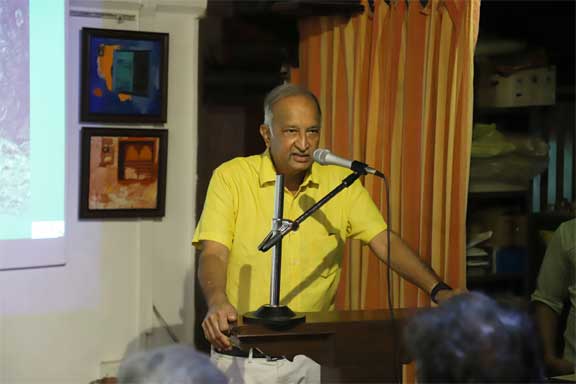INTACH Mangaluru Chapter Organizes Talk on “Saving Wildlife in Changing India” by Dr. Ullas Karanth
7:42 PM, Thursday, August 8th, 2024Mangaluru : The Mangaluru Chapter of the Indian National Trust for Art and Cultural Heritage (INTACH) organized a special talk on “Saving Wildlife in Changing India” by Dr. K. Ullas Karanth, a renowned conservation zoologist and tiger expert, on Wednesday, August 7, 2024, at 6:00 PM at the Kodialguthu Centre for Art and Culture, Kodialguthu West, G.G. Road, Ballalbagh, Mangalore.
Addressing the gathering, Dr. Karanth highlighted that although India comprises just 2.2 percent of the world’s land area, it harbors 7.7 percent of the mammal species, 13 percent of the bird species, and 24 percent of the carnivorous species. “This incredible biodiversity, resulting from continental drift and various evolutionary factors, was on the brink of collapse in the 1960s due to widespread hunting and rampant timber logging. The imminent disaster was averted only through the timely intervention of then Prime Minister Indira Gandhi, who launched Project Tiger and enforced stringent laws,” he stated.
Dr. Karanth further explained that wildlife conservation gained traction due to the political support from Indira Gandhi, a few central and state ministers, and some sincere forest department officers who went beyond the call of duty. During this period, a new generation of wildlife enthusiasts and independent researchers, including himself, began substantial groundwork. “Despite these efforts, only about 10 percent of the land serves as wildlife habitat, with approximately 4 percent designated as protected areas. Most of the growth in wildlife population occurs in these protected spaces,” he noted.
Dr. Karanth attributed the success of conservation efforts to the country’s species-centered approach. “Wildlife conservation is not solely about a particular animal but about preserving entire ecosystems comprising predators, prey species, and other flora and fauna. By adopting a species-centered approach, such as Project Tiger or Project Elephant, public attention could be focused on these charismatic animals rooted in local culture, thus generating the social momentum needed to support large-scale conservation efforts,” he explained. Although we celebrate having over 3,000 tigers in the wild today, this number is too low considering the four-decade-long effort. If focused scientific methods are extended beyond protected areas, the country has the capacity to sustain a healthy tiger population of 15,000,” he said.
Recalling his journey, Dr. Karanth shared that his passion for wildlife was ignited at the age of eight during his stay in Mangalore, when he was gifted a book on birds by Salim Ali and saw some of those birds in the vicinity. He later became inspired by the renowned conservationist George Schaller, who conducted the first scientific study of tigers in India. Describing his contributions, he mentioned that he found the prevailing method of counting pugmarks ineffective in accurately assessing the tiger population. He developed a new system using camera traps to identify and document individual tigers based on their unique body markings. He also adopted an emerging method of installing radio collars on wild tigers to monitor their behavior, which had proved successful in Nepal. These innovations helped gather reliable data for the scientific study of tigers.
Concluding the talk, Dr. Karanth emphasized that while trophy hunting, commercial hunting, and hunting for food were the main threats to wildlife in the past, today, there is widespread appreciation for wildlife conservation even at the village level, with people contacting forest officials whenever there is a problem. However, the lucrative wildlife trade remains a threat. The rapidly increasing human population and the resultant rise in aspirations are putting immense pressure on natural resources, further depleting the remaining scarce forest land. “Finding sustainable energy solutions is crucial for future nature conservation,” he asserted.
Subhas Chandra Basu, convener of the INTACH Mangaluru Chapter, welcomed the gathering and moderated the program. Architect Niren Jain introduced the guest speaker.
Simillar Posts
Warning: count(): Parameter must be an array or an object that implements Countable in /home/megamcaq/public_html/wp-content/plugins/post-plugin-library/common_functions.php on line 357
- None Found
Leave a Reply
© Copyright 2008 www.megamedianews.com All Rights Reserved. Privacy Policy









 Posted in
Posted in  Tags:
Tags: 



